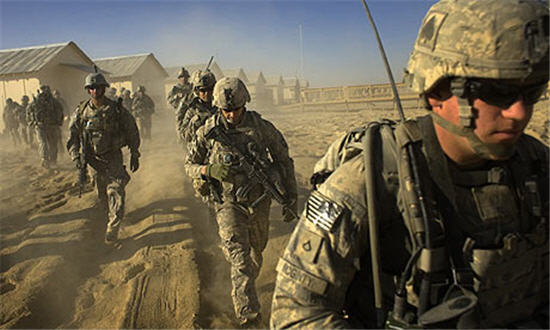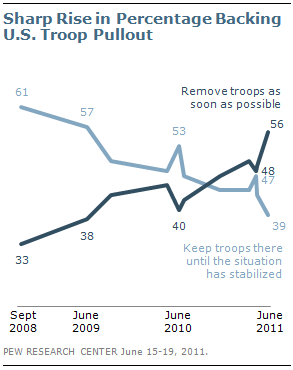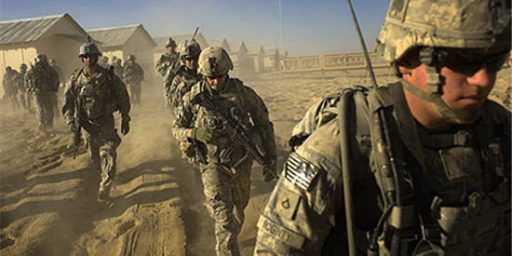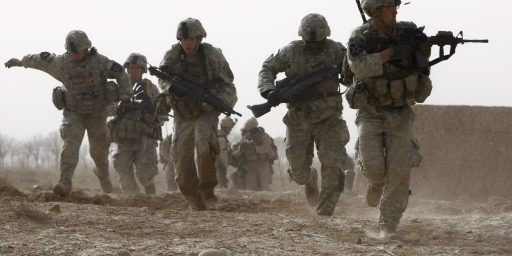Majority Of Americans Want Troops Removed From Afghanistan ASAP
As the President prepares to announce his plans for the future in Afghanistan, a majority of Americans want the troops home now.
As President Obama prepares to announce to the nation his plans for American military forces in Afghanistan, which are expected to consist of a drawdown of as many as 30,000 troops by the end of 2012, a new Pew poll shows that voters want the troops home immediately:
For the first time, a majority (56%) says that U.S. troops should be brought home as soon as possible, while 39% favor keeping troops in Afghanistan until the situation has stabilized.
The proportion favoring a quick withdrawal of U.S. forces has increased by eight points since last month (from 48%), immediately after the killing of Osama bin Laden. A year ago, just 40% favored removing the troops as soon as possible, while 53% favored keeping them in Afghanistan until the situation stabilized.
Americans continue to say the decision to use force in Afghanistan was the right one, and 58% believe the United States will definitely or probably succeed in achieving its goals in Afghanistan. That is largely unchanged from the 62% who said the U.S. would achieve its goals in Afghanistan shortly after Osama’s death. But at the same time, a majority (56%) says it is unlikely that Afghanistan will be able to maintain a stable government after the U.S. military leaves.
Even among those who predict the U.S. will be successful in Afghanistan, nearly as many favor removing the troops as soon possible (46%) as favor keeping then there until the situation is stable (51%). Among those who say the U.S. will definitely or probably fail in achieving its goals – 34% of the public – a large majority (75%) supports removing the troops as soon as possible.
The most stark take-away point from the poll is the fact that public opinion on the war has taken a complete 180 degree turn from where it was just three years ago:
This isn’t the only poll showing how strongly the public has turned against the war in Afghanistan, of course. Back in March, one poll showed that two-thirds of Americans didn’t think the war in Afghanistan was worth fighting, and the Pew results have been replicated elsewhere:
A few weeks ago, CBS found a massive 16-point surge over the past month in support of decreasing troop levels in Afghanistan. I don’t know how to explain the sudden spikes except as a slightly delayed reaction to killing Osama, which of course was one of the goals of the operation in the first place — convincing the public that the mission in Afghanistan, such as it is, has now basically been accomplished by turning the head of Al Qaeda into fish food. The fact that 51 percent also say they expect the U.S. to achieve its goals in the country and believe that the military effort is going “very well” confirms that people aren’t endorsing pulling out in despair and exasperation at Karzai but in the conviction that we’ve … sort of done what we came to do.
And, I would add, a belief that the mission of trying to build a nation in a country like Afghanistan isn’t something that the United States ought to even be trying to do.
Given these polls, one wonders if President Obama isn’t being just a little too timid with the plan he will apparently announce tonight. A 30,000 troop withdrawal is nothing to sneeze at, of course, and it’s certainly welcome, especially since there will apparently be at least 10,000 troops who will be brought home by the end of this year. At the same time, though, there’s clear political sentiment for getting out sooner that Obama is arguably ignoring here and his plan is likely to please nobody:
Caught between the Pentagon brass and his political base, President Barack Obama will start his long-promised wind-down of the Afghanistan war in a speech Wednesday night that seems sure to please no one.
The generals want to stick it out. His supporters – and a growing number of Republicans – think Obama can’t get out of Afghanistan fast enough, particularly now that Osama bin Laden is dead.
And so it’s left to Obama to calibrate a withdrawal that preserves a decade of modest but hard-fought gains in Afghanistan but also looks and feels like the war is actually coming to an end.
His preferred approach: Obama is expected to announce his plan to withdraw 33,000 U.S. troops by the end of 2012, with at least 5,000 personnel due to leave by the end of this year, according to administration officials.
Obama is certain to claim success. That approach would amount to a full rollback of the surge he announced in December 2009, down from roughly 100,000 troops at the peak of the conflict.
But it’s far from ending the war. Even by the time Obama faces reelection next fall, U.S. troop levels in Afghanistan will stand at about 70,000 — double the 34,000 there when the president took office, under the scenario expected by top Obama aides.
That’s not likely to please Americans who want the Afghan War over with already, and it’s likely to be criticized by those in Congress who have called for a more aggressive withdrawal. Politically then, this appears to be another opening for a non-interventionist argument that I wrote about last week. Right now, though, Republican criticism of continued occupation of Afghanistan has been muted, at least among those running for President. While the economy will inevitably be the major issue on voters minds in November 2012, it seems rather obvious that a candidate who calls for a change in American policy in Afghanistan and a more rapid withdrawal of troops would be welcomed by the voters.








A majority of Americans thought invading and occupying Iraq was a great idea. I have a real problem basing military strategy and tactics on what the majority of Americans think. If a republican was in office the republicans would be all-in. they are un-interested and incapable of actually governing, and if they hadn’t screwed the pooch by taking their eyes off the ball we wouldn’t even be having this conversation.
I can justify Afghanistan even if I don’t like the idea of the war. It’s Iraq that we should have never invaded, and I don’t believe that we have any business in Libya.
Truth is any military engagement that has no defined end is a bad engagement. 10 years… think about that 10 years and nothing but dead soldiers. The only people who win are the people selling stuff to the US Taxpayer and many of these people don’t pay taxes. It’s a one way street… the ultimate consumable.
You mean there’s a downside to instantaneous direct democracy?